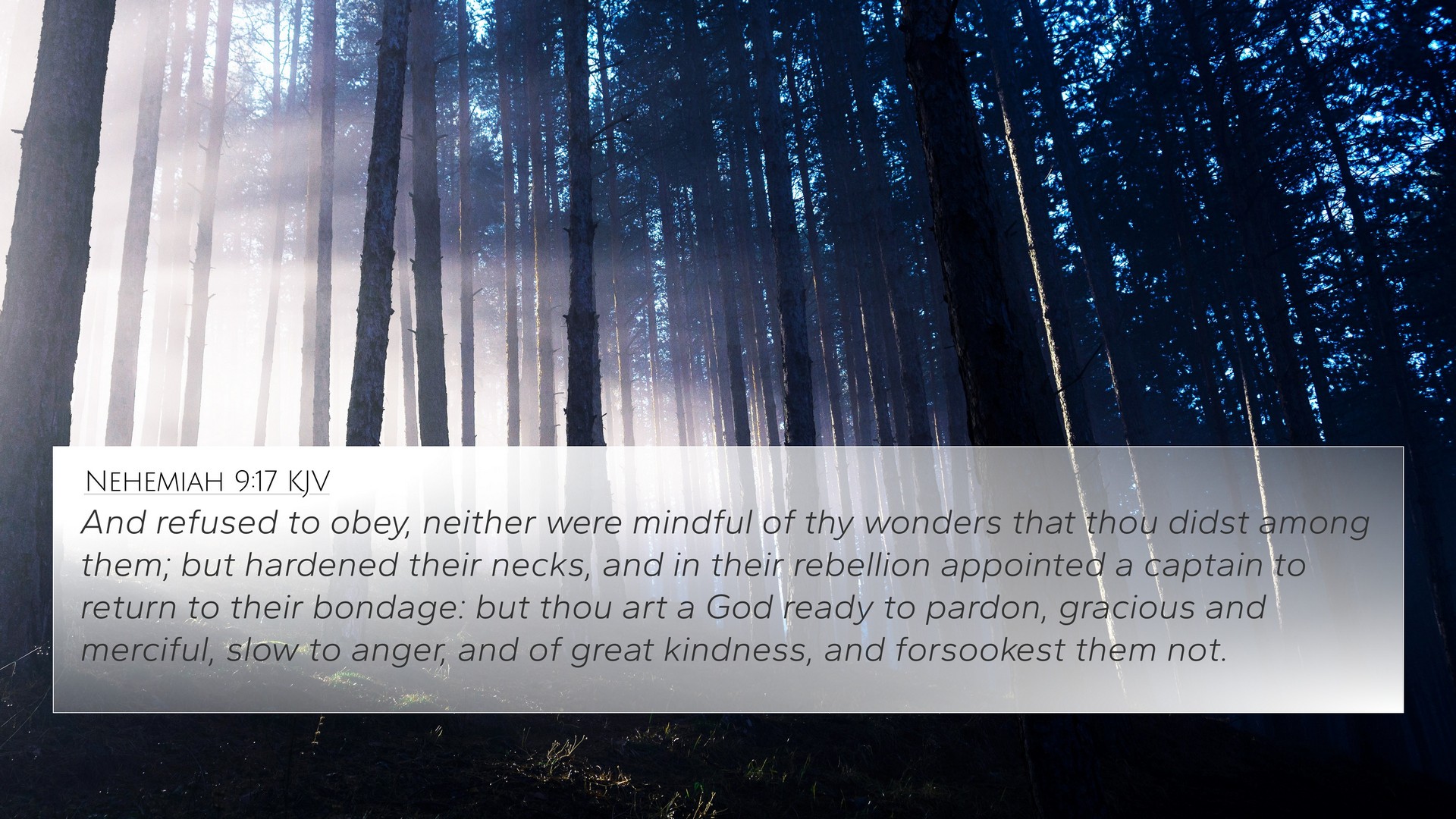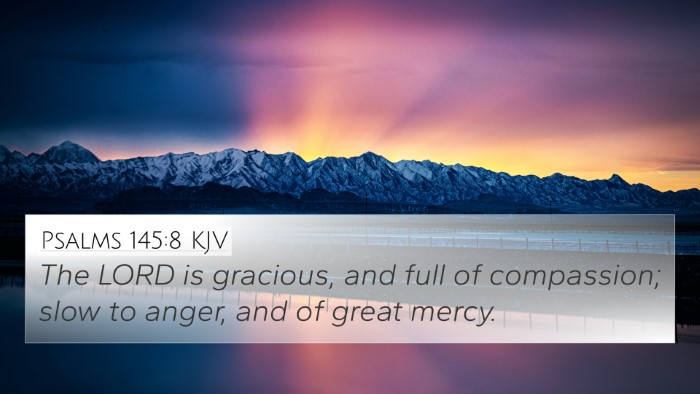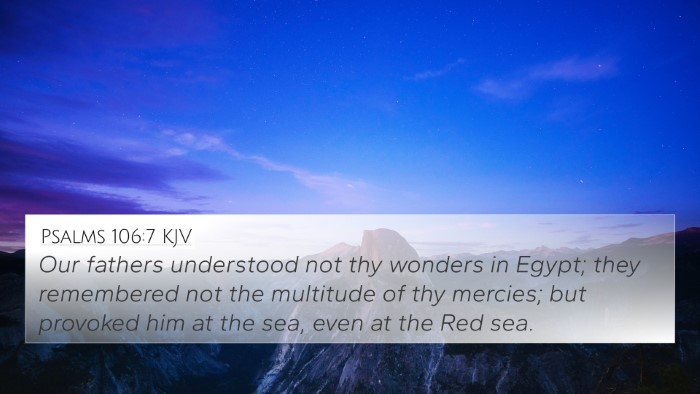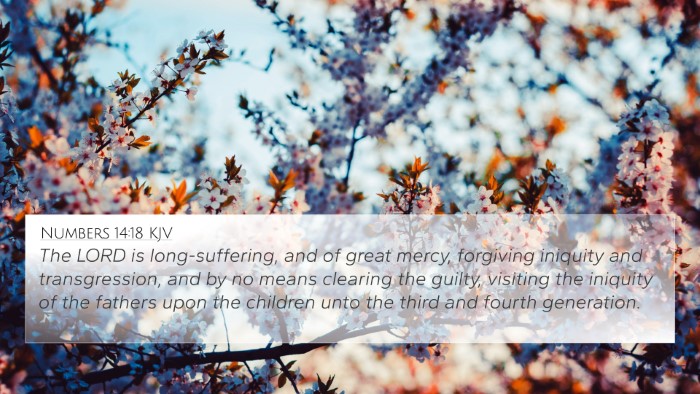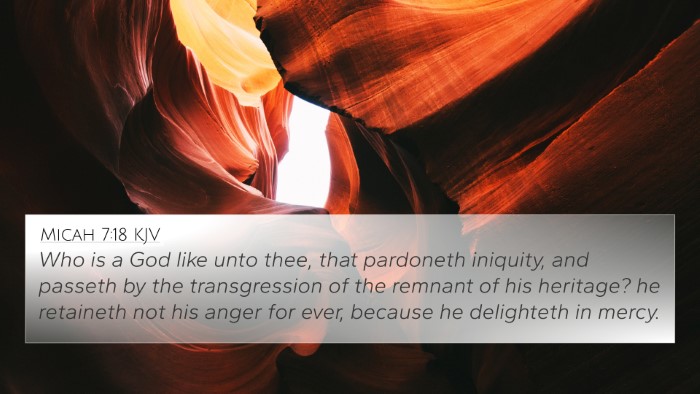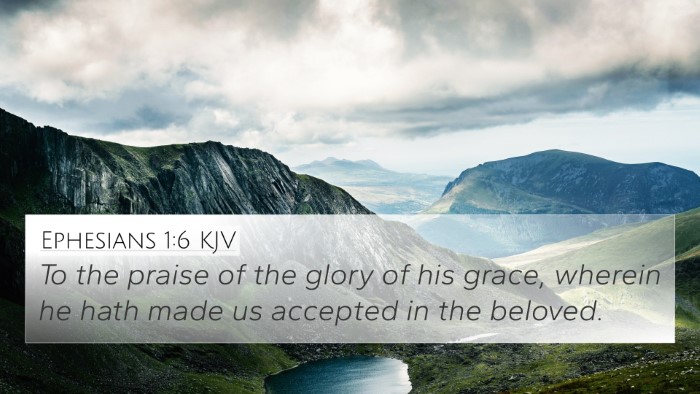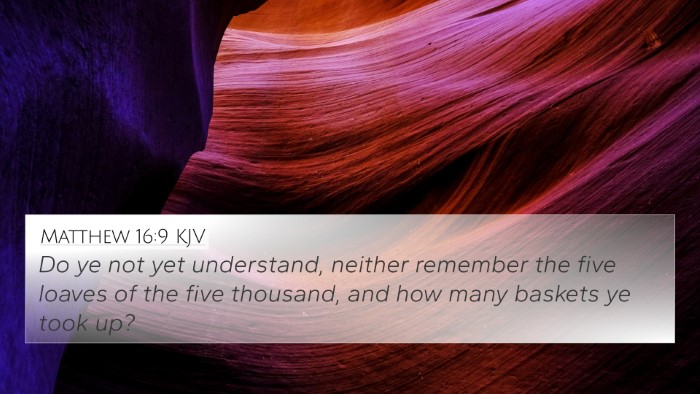Understanding Nehemiah 9:17
Nehemiah 9:17 states, "And refused to obey, neither were mindful of thy wonders that thou didst among them; but hardened their necks, and in their rebellion appointed a captain to return to their bondage: but thou art a God ready to pardon, gracious and merciful, slow to anger, and of great kindness, and forsookest them not." This verse encapsulates a critical moment of remembrance and reflection on the disobedience of the Israelites and the steadfast mercy of God. Below is an analysis of this verse, integrating insights from public domain commentaries.
Key Themes in Nehemiah 9:17
This verse touches on several important themes, including:
- Human Disobedience: The unwillingness of the Israelites to obey God's commands, highlighting a recurring pattern in their history.
- Divine Mercy: Despite their rebellion, God’s readiness to pardon is emphasized, showcasing His grace.
- Historical Reflection: It serves as a reminder of the Israelites' past actions and God's nature throughout their history.
Commentary Insights
From the perspective of various biblical scholars, the meaning of this verse can be elaborated upon as follows:
Matthew Henry's Commentary
Matthew Henry emphasizes the pattern of disobedience shown by the Israelites, pointing out that they not only neglected God's commands but also forgot the miraculous wonders He performed. This forgetfulness led to a hardness of heart where they chose rebellion over loyalty. Henry notes that the people even sought to return to bondage in Egypt, illustrating their lack of faith in God’s deliverance.
Albert Barnes' Commentary
Albert Barnes elaborates on the characteristics of God listed in this verse. He pays special attention to God's attributes: He is portrayed as ready to forgive, merciful, and slow to anger. Barnes argues that these traits set the foundation for genuine repentance. Despite Israel’s failures, God’s kindness remains ever-present, underscoring the theme of grace.
Adam Clarke's Commentary
Adam Clarke highlights the historical context of the verse, noting the significance of the Israelites' choice to appoint a captain to lead them back to Egypt. He sees this act as a metaphor for spiritual backwardness and a rejection of God's plans. Clarke emphasizes God's eternal patience with His people, who, despite their rebellion, continue to receive His grace and kindness.
Bible Verse Cross-References
To further understand the themes in Nehemiah 9:17, consider the following cross-references:
- Exodus 32:9-10: God's response to Israel’s disobedience in the wilderness, showcasing anger and a call for Moses to lead intercession.
- Psalm 78:40-41: A depiction of how often the Israelites provoked the Lord and limited His work due to their unbelief.
- Isaiah 63:10: Reflects the consequences of rebellion against God's Spirit, emphasizing divine sorrow over disobedience.
- Romans 5:20: Paul discusses how sin abounds but God’s grace abounds even more, echoing the mercy shown in Nehemiah.
- 2 Chronicles 30:9: A call to return to the Lord, assuring that He is gracious and will not turn His face from those who seek Him.
- Jeremiah 3:12: God's pleading with Israel to return and the assurance of mercy despite their waywardness.
- Ephesians 2:4-5: Paul describes the rich mercy and grace we receive through Christ, mirroring God’s kindness in Nehemiah.
Thematic Bible Verse Connections
When one examines the connections between Bible verses, we see consistent themes of sin, mercy, and redemption. The following thematic connections can be drawn:
- Divine Patience: God's gentleness in dealing with persistent sinners is a theme found throughout Scripture.
- Call to Repentance: Many verses encourage turning back to God, reflecting a mutual desire for reconciliation.
- The Nature of God: Scripture consistently emphasizes God's attributes of grace, mercy, and love, providing comfort to believers.
Conclusion
Nehemiah 9:17 serves as a powerful reminder of the Israelite’s journey, their disobedience, and most importantly, God’s unwavering mercy. Through cross-referencing this verse with others in Scripture, believers can deepen their understanding of God's character and His enduring love for His people. This verse not only reflects historical events but also encourages present-day believers to recognize the importance of obedience, repentance, and the grace that God continually offers.
Additional Study Tools
Those interested in further exploring the connections between biblical texts can benefit from utilizing various tools for Bible cross-referencing:
- Bible Concordance: A tool to find where specific words appear throughout the Bible.
- Cross-Reference Guide: Guides that outline thematic links and related verses.
- Bible Reference Resources: Materials that assist in locating related scripture passages for deeper study.
- Cross-reference Bible study methods: Helpful strategies for conducting thorough biblical analysis through interlinked themes.
